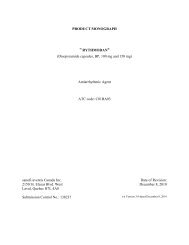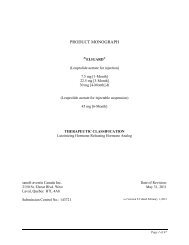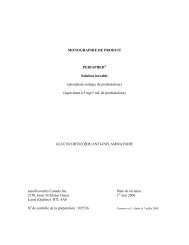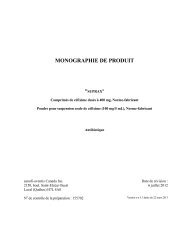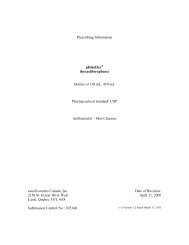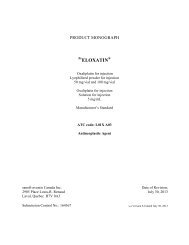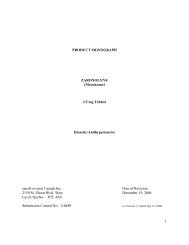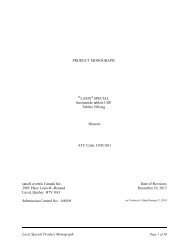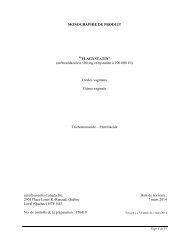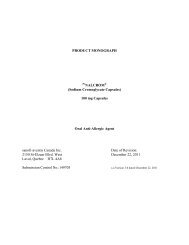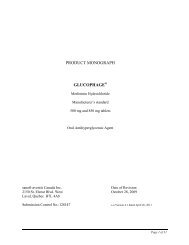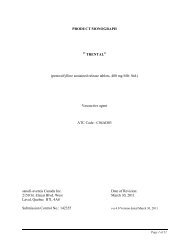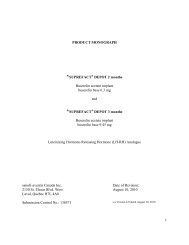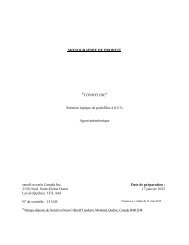Apidra (insulin glulisine) - Sanofi Canada
Apidra (insulin glulisine) - Sanofi Canada
Apidra (insulin glulisine) - Sanofi Canada
You also want an ePaper? Increase the reach of your titles
YUMPU automatically turns print PDFs into web optimized ePapers that Google loves.
history of diabetes, or in patients receiving<br />
concurrent treatment with certain other drugs. Such<br />
situations may result in severe hypoglycemia (and<br />
possibly, loss of consciousness) before a patient has<br />
symptoms.<br />
Some people may not recognize when their blood<br />
sugar drops low. Without recognition of early<br />
warning symptoms, you may not be able to take steps<br />
to avoid more serious hypoglycemia. Be alert for all<br />
of the various types of symptoms that may indicate<br />
hypoglycemia. Patients who experience<br />
hypoglycemia without early warning symptoms<br />
should monitor their blood glucose frequently,<br />
especially prior to activities such as driving a car or<br />
use mechanical equipment. If the blood glucose is<br />
below your normal fasting glucose, you should<br />
consider eating or drinking sugar-containing foods to<br />
treat your hypoglycemia.<br />
If you have frequent episodes of hypoglycemia or<br />
experience difficulty in recognizing the symptoms,<br />
you should consult your health professional to<br />
discuss possible changes in therapy, meal plans,<br />
and/or exercise programs to help you avoid<br />
hypoglycemia.<br />
Hyperglycemia<br />
Hyperglycemia (too much glucose in the blood) may<br />
develop if your body has too little <strong>insulin</strong>.<br />
Hyperglycemia can be brought about by:<br />
• intercurrent conditions (illness, stress, or<br />
emotional disturbances),<br />
• not taking your <strong>insulin</strong> or taking less than<br />
recommended by your health professional,<br />
• malfunction and/or misuse of medical<br />
devices,<br />
• eating significantly more than your meal<br />
plan suggests,<br />
• a new <strong>insulin</strong> type or schedule,<br />
• some new medications, including<br />
prescriptions, over-the counter medications,<br />
herbs, vitamins and street drugs.<br />
Symptoms of hyperglycemia include:<br />
• confusion or drowsiness,<br />
• increased thirst,<br />
• decreased appetite, nausea, or vomiting,<br />
IMPORTANT: PLEASE READ<br />
• rapid heart rate,<br />
• increased urination and dehydration (too<br />
little fluid in your body),<br />
• blurred vision,<br />
• flushed dry skin,<br />
• acetone odour of breath.<br />
Hyperglycemia can be mild or severe. It can<br />
progress to high glucose levels, diabetic<br />
ketoacidosis (DKA), and result in unconsciousness<br />
and death.<br />
Diabetic ketoacidosis (DKA)<br />
The first symptoms of diabetic ketoacidosis usually<br />
come on over a period of hours or days. With<br />
ketoacidosis, urine tests show large amounts of<br />
glucose and acetone.<br />
Symptoms of diabetic ketoacidosis include:<br />
First symptoms:<br />
• drowsiness,<br />
• flushed face,<br />
• thirst,<br />
• loss of appetite,<br />
• fruity smelling breath,<br />
• rapid, deep breathing,<br />
• abdominal (stomach area) pain.<br />
Severe symptoms:<br />
• heavy breathing,<br />
• rapid pulse.<br />
Prolonged hyperglycemia or diabetic ketoacidosis<br />
can lead to:<br />
• nausea,<br />
• vomiting,<br />
• dehydration,<br />
• loss of consciousness,<br />
• death.<br />
Severe or continuing hyperglycemia or DKA<br />
requires prompt evaluation and treatment by<br />
your health professional.<br />
Allergic reactions<br />
In rare cases, a patient may be allergic to an <strong>insulin</strong><br />
product. Severe <strong>insulin</strong> allergies may be life-<br />
Page 53 of 61



